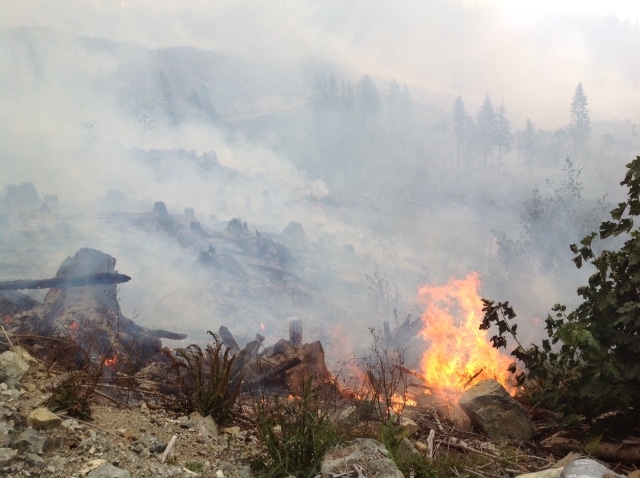Smokey haze, intense heat, encampments of evacuated residents next to the highway: these were the conditions that greeted Renee Lertzman when she recently drove through Oregon. It’s no wonder why the environmental psychology researcher and professor resorts to the term “apocalyptic” to describe the scene.
“It was a surreal experience,” says Lertzman, who teaches at Victoria’s Royal Roads University. “We’re all driving along and it’s so smoky and it’s terrifying. Yet we’re all doing our summer vacation thing. I couldn’t help but wonder: what is going on, how are people feeling and talking about this?”
It’s really the question of the hour. Catastrophic wildfires and droughts have engulfed much of the continent, with thousands displaced from their homes; air quality alerts confine many of the lucky remainder behind locked doors (with exercise minimized and fresh-air intakes closed).
Firefighters have been summoned from around the world to battle the unprecedented fires, which are undoubtedly exacerbated by climate change. Yet the seemingly reasonable assumption that witnessing such horrific natural disasters may increase support for action on climate change is vastly overestimated, Lertzman tells DeSmog Canada.
“I think it’s a fantasy that the worse things get and the more intense the effects are … that will magically translate into a public and political recognition and engagement and getting on board,” she says. “There’s an abundance of evidence that’s not the case and that humans have enormous capacity to avoid and deny reality and what’s staring us right in the face.”
34 ‘Dragons of Inaction’ Impede Climate Action
Humans’ tendency toward denial and avoidance is incredibly complex and entrenched.
Robert Gifford, professor of psychology and environmental studies at University of Victoria, has charted 34 (previously 29) ‘dragons of inaction,’ which prevent people from responding to evidence of climate change, ranging from a naive belief in “technosalvation,” to lack of attachment to geographic place, to straight-up denial.
While often tangled and deeply rooted, Gifford optimistically concluded a 2011 paper for American Psychologist with the statement: “The dragons of inaction can be beaten back, if not slain.”
In an interview with DeSmog Canada, Gifford says he experienced an epiphanic moment about climate change while gazing out at Victoria’s inner harbour and noticing a brown pelican, a bird uncommon in the region. Recent events, such as limbs dropping from Garry oak trees due to drought conditions, may serve as “the brown pelican moment for a lot of people in Victoria,” he says.
But it’s a very delicate situation. If large environmental organizations resort to overkill in responding to such conditions (as they have in the past, Gifford says), such efforts may alienate supporters instead of confronting the aforementioned dragons.
“Going back to the old anti-smoking literature, fear messages can go too far,” he says. “Not that they’re always wrong but if you show pictures of people who are on their death bed, people just block it out. You have to get people concerned, but can’t go too far. And you especially can’t give wrong information: not only does it not work, but it gives fodder to the bad guys.”
Moving Beyond Paralysis
It’s an issue many environmental psychologists are concerned about. Lertzman contends that plenty of people care deeply about climate change but are often paralyzed by the sheer enormity of the issue.
Visual representations of Alberta’s oilsands are frequently juxtaposed with images of devastating fires and floods, a combination that fails to acknowledge the “lived experienced or texture in our lives related to carbon and fossil fuels and coal” and creates a “huge vacuum where people can get mired and really stuck.”
Much of the issue returns to perceptions about the potential for individual and communal impact to help adapt and mitigate climate change (a concept broadly known as the ‘internal locus of control’).
Gifford stresses that empowerment messages are far more successful than calls for sacrifice. Lertzman echoes that sentiment, pointing to three ‘As’ that anchor responses to situations like the summer of 2015 — anxiety, ambivalence and aspiration — and that many environmental efforts can miss the mark if they fail to recognize the emotional significance of each.
She suggests it’s very important “to lead with that really human response: I’m really scared or I’m feeling really sad or confused or overwhelmed. The more we name and acknowledge that, the more it really does help us leverage the burning platform — an awful phrase given the situation — to leverage the crises that are merging and are only going to continue.”
It’ll also take a lot of compassion, she says, beginning with compassion for ourselves: most North Americans live very carbon-intensive lives. This fact is further convoluted by the “dragons” — Gifford points to two in particular as plaguing energy-producing provinces like Alberta: sunk costs (if you work or hold investments in the oilsands, you’re more likely to rationalize it) and system justification (if things are working, don’t rock the boat). Yet both are optimistic that encounters with wildfires and droughts — whether in person or via the media — can help move the needle on climate change action, if communicated correctly.
“There’s real opportunity there because it can force us to really think creatively and critically about how we live and how we want to live and what kind of future we want to have,” Lertzman concludes.
Photo: Lizard Lake wildfire by B.C. Wildfire Service.
Subscribe to our newsletter
Stay up to date with DeSmog news and alerts






